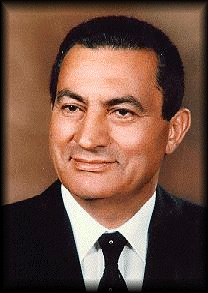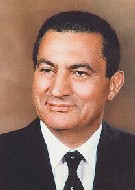What do you know about The Egyptian President?
@ProfessorPharmacist (1107)
Egypt
11 responses
@unisis (1673)
• Indonesia
25 Jan 07
Mohammad Husni Mubarak biografi
Date of Birth 04-May-1928
City of Birth Menoufeya Governorate Egypt
National Democratic Party:President of the National Democratic Party
National Democratic Party:member of the National democratic Party
National Democratic Party:member of the Political Bureau
Education
1948 Bachelor of Military Sciences (Egypt)
1950 BA in Aviation Sciences (Egypt)
1964 FROUNZ Military Academy, USSR (Russia)
Past Occupation1952
1959 Lecturer in Air Force Academy (Egypt)
1964 Commander of Cairo West Air Base (Egypt)
1968 Director of the Air Force Academy (Egypt)
1969 Chief of Staff of the Air Force (Egypt)
1972 Commander of the Air Force and Deputy Minister of War (Egypt)1974
1974 Lieutenant General (Egypt)
1975 Vice-President of the Arab Republic of Egypt (Egypt)
1979 Vice President of the National Democratic Party (NDP) (Egypt)
1982 2000 President of the National Democratic Party (Egypt)
1989 1990 Chairman of the Organization of African Unity (Egypt)1996
1996 Chairman of the Arab Summit (Egypt)
1998 2000 Chairman of the G-15 (Egypt)
2 people like this
@ProfessorPharmacist (1107)
• Egypt
28 Jan 07
Very very good identification card!.
1 person likes this
@lucy02 (5015)
• United States
30 Dec 06
I am embarassed to admit I didn't know much about President Mubarak. I had to do a search on Yahoo. From what I read he must be a very good president as he has been reelected several times and has won several awards plus being very active in the Egyptian Air Force when he was younger. I was surprised that I didn't know much about him. He apparently hasn't received the publicity that Pres. Sadat did.
1 person likes this
@marciascott (25529)
• United States
30 Dec 06
thank you, You just gave me some information about this President. Have a Happy New Year.
1 person likes this
@ProfessorPharmacist (1107)
• Egypt
31 Dec 06
Yes, President Sadat & Nasser were much more popular than him.
@eu_ursuletzu (1197)
• Romania
24 Jan 07
I'm loking at tv very much,specialy on discovery channel,and i am learning a lot from there.So this is why i know a lot about him.Mubarak was born in "Kafr El-Meselha", Al Monufiyah Governorate, Egypt. Upon completion of high school, he joined the Egyptian Military Academy, where he received a Bachelor's Degree in Military Sciences in 1949. In 1950, he joined the Air Force Academy and eventually earned a Bachelor's Degree in Aviation Sciences, and was assigned to the bombers squadrons. Part of his pilot's training he received at the Soviet pilot training school in Frunze (current Bishkek), in Soviet Kyrgyzstan. He then moved up the chain of command, holding the positions of pilot, instructor, squadron leader, and base commander. In 1964, he was appointed head of the Egyptian Military Delegation to the USSR.In the years between 1967 and 1972, during the War of Attrition between Egypt and Israel, Mubarak was appointed Director of the Air Force Academy and Chief of Staff of the Egyptian Air Force. In 1972, he became Commander of the Air Force and deputy minister of war. In October 1973, following the October War, also known as Yom Kippur War and the 10th of Ramadan War, Mubarak was promoted to the rank of Air Chief Marshal. In April 1975, he was appointed Vice-President of Egypt and, in 1978, he was selected as Vice-Chairman of the National Democratic Party (NDP).Following the assassination of President Sadat by fundamentalists in 1981, Mubarak became President of the Arab Republic of Egypt and the Chairman of the National Democratic Party (NDP). Mubarak has escaped no fewer than six assassination attempts.[1].Hosni Mubarak is married to Suzanne Mubarak, and has two sons: Alaa, and Gamal
President Mubarak has been re-elected by majority votes in referenda for successive terms on four occasions: in 1987, 1993, 1999 and 2005. The results of the referenda are of questionable validity. No one runs against the President due to a restriction in the Egyptian Constitution in which the People's Assembly plays the main role in electing the President of the Republic. However in February 2005 Mubarak passed a constitutional amendment allowing parties directly running against the incumbent president. As expected, he was re-elected.After increased domestic and international pressure for democratic reform in Egypt, on February 26, 2005 Mubarak asked the largely rubber stamp parliament to amend the constitution to allow multi-candidate presidential elections by September 2005. Previously, Mubarak secured his position by having himself nominated by parliament, then confirmed without opposition in a referendum.
The September 2005 ballot was therefore a multiple candidate election rather than a referendum, but the electoral institutions, and security apparatus remain under the control of the President. The official state media, including the three government newspapers and state television also express views identical to the official line taken by Mubarak. In recent years however, there has been a steady growth in independent news outlets, especially independent newspapers which occasionally criticize the President and his family severely. Satellite channels beaming from Egypt such as the Orbit Satellite Television and Radio Network for example, also exhibit relative openness as exhibited in their flagship program Al Qahira Al Yawm. However, Mubarak started to lose support in Egypt in the mid-1990s. The breakthrough economic performance of the early 1990s was wasted. In the last few years however, a cabinet headed by Prime Minister Ahmed Nazif has been somewhat successful in turning things around. According to the List of countries by Human Development Index Egypt ranks 111th out of 177 countries, and rates 0.702 on the index.
On July 28, Mubarak announced his candidacy, as he had been widely expected to do. The election which was scheduled for September 7 involved mass rigging activities according to civil organizations that observed the elections. Reports have shown that Mubarak's party used government vehicles to take public employees to vote for Mubarak. Votes were bought for Mubarak in poor suburbs and rural areas. It was also reported that thousands of illegal votes were allowed for Mubarak from citizens who were not registered to vote. On September 8, Dr. Ayman Nour, a dissident and candidate for Al-Ghad party, contested the election results and demanded a repeat of the election. On September 9, the Egyptian Electional Committee, consisting of several independent judges denied the demands of Dr. Ayman Nour and he was later given a five year jail sentence for forging signatures, a charge that Nour strongly denies.On the day of Nour's guilty verdict and sentencing, the White House Press Secretary released the following statement denouncing the government's action:"The United States is deeply troubled by the conviction today of Egyptian politician Ayman Nour by an Egyptian court. The conviction of Mr. Nour, the runner-up in Egypt's 2005 presidential elections, calls into question Egypt's commitment to democracy, freedom, and the rule of law. We are also disturbed by reports that Mr. Nour's health has seriously declined due to the hunger strike on which he has embarked in protest of the conditions of his trial and detention. The United States calls upon the Egyptian government to act under the laws of Egypt in the spirit of its professed desire for increased political openness and dialogue within Egyptian society, and out of humanitarian concern, to release Mr. Nour from detention."Despite these reports by some observers however, a poll released by the Pew Research Center indicate that an overwhelming majority of Egyptians express confidence in Mubarak's leadership, with some 86% of those polled indicating they had either "a lot of confidence" or "some confidence" in Mubarak's leadership
As Alaa left the picture around the year 2000, Mubarak's second son Gamal started rising in the National Democratic Party and succeeded in getting a newer generation of neo-liberals into the party, and eventually the government. Due to Gamal's increasing visibility and influence, rumours about his being groomed for the presidency became common. Nevertheless, this was publicly refuted by the president several times. Many believe that his succession would mean a hereditary pseudo-monarchy .Prior to Mubarak assuming the presidency, former Egyptian President Sadat ordered Shenouda III of Alexandria, the Pope of the Orthodox Coptic church into exile at the Monastery of St. Bishoi. In addition, eight bishops, twenty-four priests, and many other prominent Copts were placed under arrest. Sadat replaced the church hierarchy with a committee of five bishops and referred to Pope Shenouda as the "ex-pope." More than three years after assuming power following Sadat's 1981 assassination, Mubarak released Pope Shenouda from exile on January 2, 1985. He returned to Cairo to celebrate the January 7th Christmas mass to a crowd of more than ten thousand. Christians have enjoyed relatively greater rights under Mubarak with their January 7th holiday (Christmas in the orthodox calendar) being declared a national holiday in 2002. However, many Copts continue to claim that Mubarak has done little to safeguard Coptic interests.
@Idlewild (6090)
• United States
5 Feb 07
I know that he became president when Anwar Sadat was assassinated. He has been in power many years, maybe 25 or 30? I'm not sure whom he has groomed as a successor. I think he's brought a lot of stability to the country, though some have complained that this has come at the cost of civil liberties, etc.
1 person likes this
@Dolcerina (3376)
• Hungary
29 Dec 06
Well, I have never heard about him.I am sorry
1 person likes this
@ProfessorPharmacist (1107)
• Egypt
31 Dec 06
Do not worry, look in this discussion and you will hear.
@ProfessorPharmacist (1107)
• Egypt
28 Jan 07
You are extremely right, Nasser was the greatest Egyptian, Arabian, Middle Eastern & African president (at least, in my opinion).
@shellyrios (1212)
• United States
29 Dec 06
I don't know too much, tell me about him and your country.
@ProfessorPharmacist (1107)
• Egypt
31 Dec 06
Ok, look at the comments below and you will know more.
@marciascott (25529)
• United States
30 Dec 06
I don't know much, the Egyptian President can you tell me something about him?
@ProfessorPharmacist (1107)
• Egypt
31 Dec 06
Ok, look in the comments here and I think you will know many things about him.
@sunflowergirl (3064)
• United Arab Emirates
29 Dec 06
i know his name dats it...but i have been to Egypt once and its a very amazing country!
@ProfessorPharmacist (1107)
• Egypt
31 Dec 06
Thank you very much, can you tell us about your journey to Egypt ?
@tictac714 (975)
• United States
28 Jan 07
well this is a little sad to admit but I have never even heard of the man.
@ProfessorPharmacist (1107)
• Egypt
28 Jan 07
How, my friend? Are you from Ghana?!!.
1 person likes this
@tictac714 (975)
• United States
28 Jan 07
yes, I am sure alright. In fact I think the only president of an African country that I am aware of is Obasanjo and that's because my boyfriend is Nigerian.
















